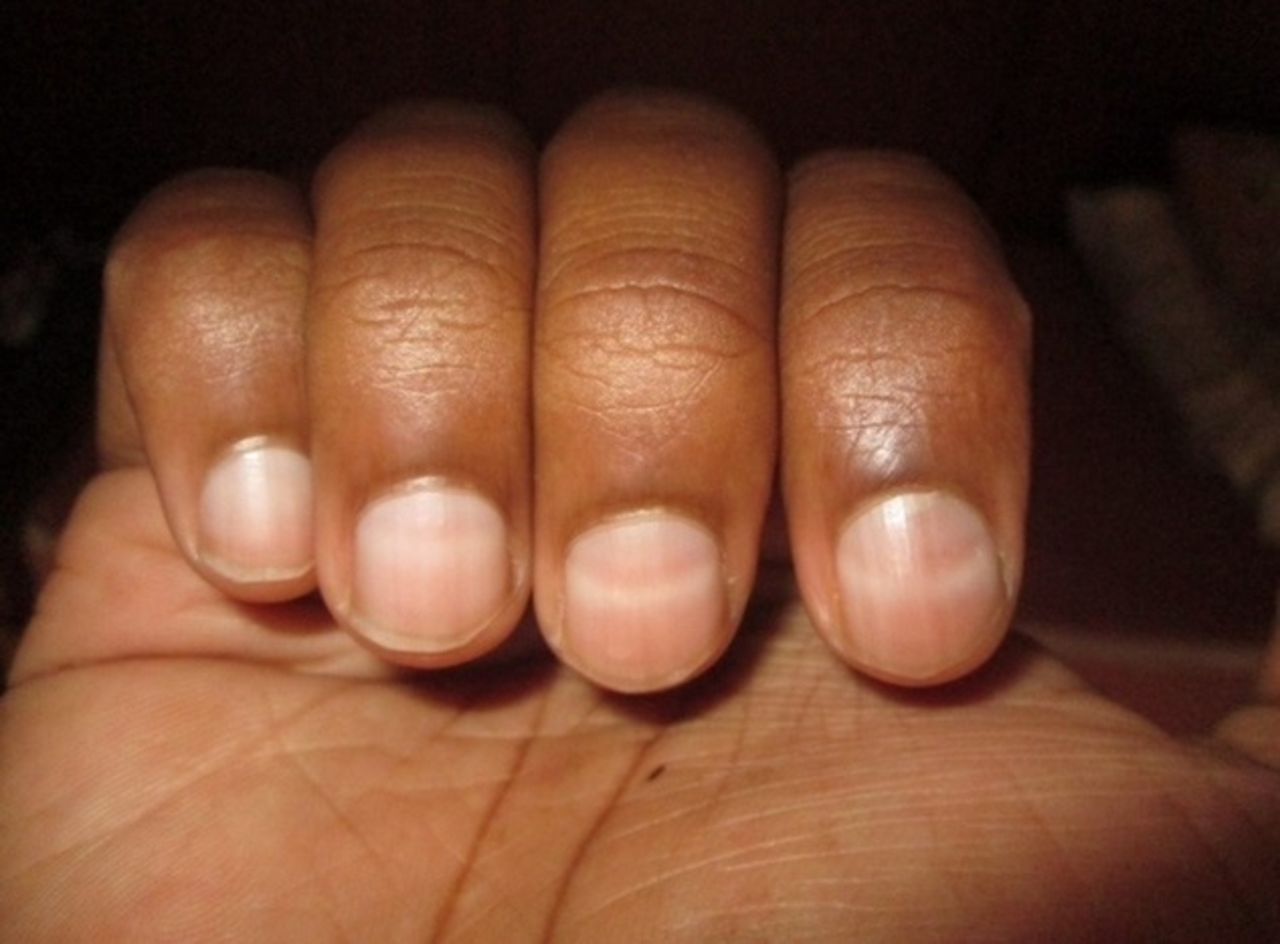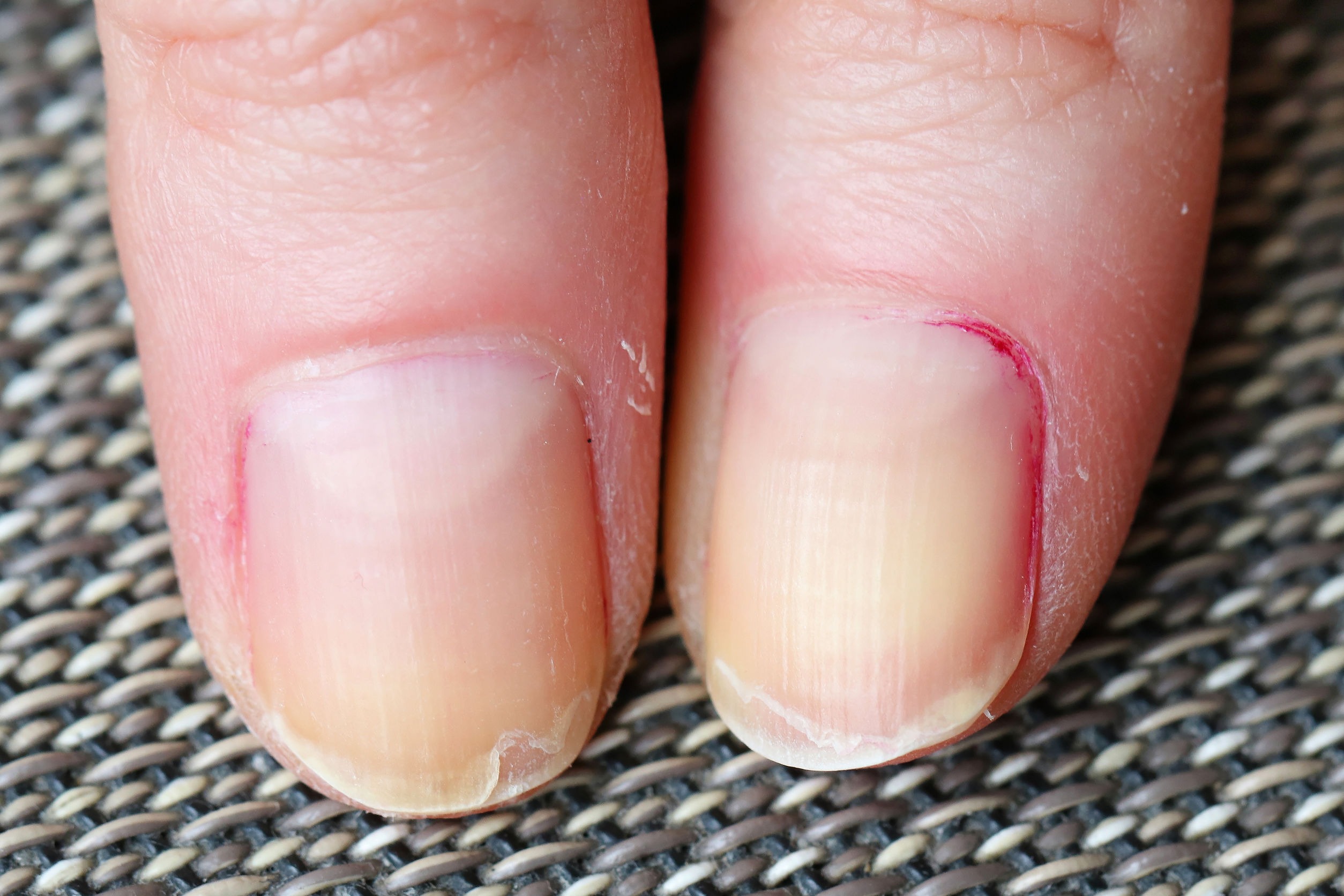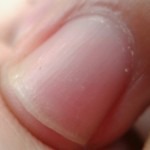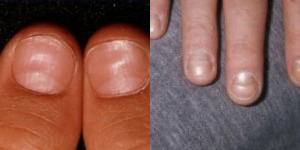If you suffer from digestive issues such as irritable bowel syndrome (IBS), FODMAP intolerance, or gluten sensitivity, fingernails may reveal more about your health than you realize. When you have digestive problems and are looking for answers, Your fingernails may provide a clue.
1. White Lines
White lines are common and can be a sign of previous trauma such as a slammed door or accidental hit on the nail. If trauma is the cause, the lines are typically only on the injured nail. The lines grow out with time. If trauma is not to blame, the two most common white lines are Muehrcke’s and Mee’s lines. Both may indicate underlying issues.
Muehrcke’s
These are paired white lines that occur horizontally across the nail bed and do not move with nail growth. They typically cross the entire nail bed and are homogenous in appearance. In contrast to traumatic lines, they usually appear on more than one nail and fade with compression.
In people with digestive disorders, low albumin (a protein in the blood), niacin (vitamin B3) deficiency, zinc deficiency, or malnutrition may be blamed for Muehrcke’s lines.
Less common causes: Chemotherapy, kidney, or liver disease.
Mees’s lines
These are white bands that go across the nail. they can indicate heavy metal toxicity with arsenic, thallium and other heavy metals. This may be important to people on a gluten-free diet. Rice is a staple on a gluten-free diet and may contain elevated levels of arsenic.
Related Article-Click Here: Arsenic In Rice And The Gluten-Free Diet

2. Split, Weak and Bendable Fingernails
These changes can occur due to aging, excessive picking of nails, and repeated exposure to water. But when coupled with digestive or other health symptoms, nutrient deficiencies and hypothyroidism must be considered causes. Iron deficiency and low protein levels may also cause those pesky splitting nails. A blood test easily evaluates levels.
Less common causes: Low folate, vitamin C, vitamin D, or calcium. Some practitioners have also implicated low stomach acid, but more research is needed to determine this correlation. If fingernails are bitten or chewed frequently, anxiety levels may need to be assessed, as chronic health issues often worsen and cause anxiety and depression.

3. Ridges

Vertical ridges are common and not typically of concern. They occur with aging due to the loss of water under the nail bed. They are equivalent to wrinkles on your skin. They can be minimized by moisturizing your nails regularly, especially near the cuticle.
Less common cause: Rheumatoid arthritis
Horizontal ridges deserve more attention than their vertical counterparts, as they indicate more serious conditions. A single horizontal ridge may indicate trauma or disruption in nail growth due to a temporary illness. If horizontal ridges recur or persist, a person should be evaluated for zinc deficiency, diabetes, or vascular disorders.
4. Scoop or Spoon Nails (Koilonychia)

Specific reasons for spoon-shaped nails or “scoop” nails in people whose digestion is compromised include iron deficiency with or without anemia and, conversely, hemochromatosis (http://www.hemochromatosis.org/), a genetic disorder that causes the body to absorb too much iron. Blood tests easily assess both conditions.
Less common causes: Raynaud’s, lupus (usually along with other symptoms of lupus), trauma, nail-patella syndrome
5. White Spots (Leukonychia)

Small white spots are common due to incidental trauma, such as bending the nail or banging it. If spots are multiple and frequent or coupled with additional symptoms, other factors must be considered.
Deficiency of zinc and calcium may occur on restricted diets or if malabsorption is present. Both have been implicated in causing white spots on the nails. Fungal infections are another cause and typically cause spots at the base or tip of the nail. The nail may split or break in addition to the spots if this is the case. Many people with digestive issues suffer from other allergies and may also have an allergic reaction to nail products. If a new product has been started and spots begin to occur, consider stopping the product from assessing causality.
Less common but serious conditions such as infections can also cause white spots. If fevers or severe systemic symptoms occur, immediate evaluation is needed.
Pay Attention
These are the five changes I see most commonly with digestive disorders such as celiac disease, IBS, FODMAP intolerance, and gluten sensitivity. If you experience any of these or other nail abnormalities, please don’t ignore them. Consult with your healthcare provider and assess the need for further evaluation. Those fingernails you thought were just for performing daily tasks and accessorizing may be hinting at a simple way to improve your health.





